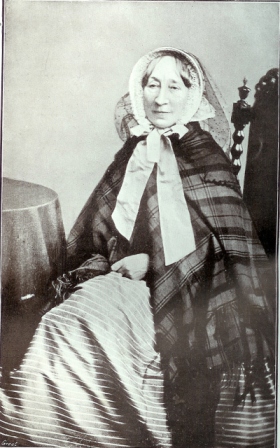This was definitely a blessing and encouragement to Brittany and I when we read this and I hope it will be to some of you as well. God is so faithful to guide according to His perfect and amazing will if we will but just trust Him and surrender ourselves fully to Him!
~Breanna
Mr. Müller shows the ordering of God in his meeting with and subsequent
marriage to his first wife, Miss Mary Groves.
“In giving her to me, I own the hand of God; nay, His hand was most marked;
and my soul says, ‘Thou art good, and doest good.’
“I refer to a few particulars for the instruction of others. When at the end
of the year 1829, I left London to
labour in Devonshire in the Gospel, a brother in the
Lord gave to me a card, containing the address of a well-known Christian lady,
Miss Paget, who then resided in Exeter,
in order that I should call on her, as she was an excellent Christian. I took
this address and put it into my pocket, but thought little of calling on her.
Three weeks I carried this card in my pocket, without making an effort to see
this lady; but at last I was led to do so. This was God’s way of giving me my
excellent wife. Miss Paget asked me to preach the last Tuesday in the month of
January, 1830, at the room which she had fitted up at Poltimore, a village near
Exeter, and where Mr. A. N. Groves,
afterwards my brother-in-law, had preached once a month, before he went out as
a Missionary to Bagdad. I accepted readily the
invitation, as I longed, everywhere to set forth the precious truth of the
Lord’s return, and other deeply important truths, which not long before my own
soul had been filled with.
“On leaving Miss Paget, she gave me the address of a Christian brother, Mr.
Hake, who had an Infant Boarding
School for young ladies and gentlemen, at
Northernhay House, the former residence of Mr. A. N. Groves, in order that I
might stay there on my arrival in Exeter
from Teignmouth. To this place I went at the appointed time. Miss Groves,
afterwards my beloved wife, was there; for Mrs. Hake had been a great invalid for
a long time, and Miss Groves helped Mr. Hake in his great affliction, by
superintending his household matters. My first visit led to my going again to
preach at Poltimore, after the lapse of a month, and I stayed again at Mr.
Hake’s house; and this second visit led to my preaching once a week in a chapel
at Exeter; and thus I went, week after week, from Teignmouth to Exeter, each
time staying in the house of Mr. Hake. All this time my purpose had been, not
to marry at all, but to remain free for travelling about in the service of the
Gospel; but after some months I saw, for many reasons, that it was better for
me, as a young Pastor, under 25 years of age, to be married. The question now
was, to whom shall I be united? Miss Groves was before my mind; but the
prayerful conflict was long, before I came to a decision; for I could not bear
the thought, that I should take away from Mr. Hake this valued helper, as Mrs.
Hake continued still unable to take the responsibility of so large a household.
But I prayed again and again. At last this decided me, I had reason to believe
that I had begotten an affection in the heart of Miss Groves for me, and that
therefore I ought to make a proposal of marriage to her, however unkindly I
might appear to act to my dear friend and brother Mr. Hake, and to ask God to
give him a suitable helper to succeed Miss Groves. On Aug. 15th, 1830, I therefore wrote to her,
proposing to her to become my wife, and on Aug. 19th, when I went over as usual
to Exeter for preaching, she
accepted me. The first thing we did, after I was accepted, was, to fall on our
knees, and to ask the blessing of the Lord on our intended union. In about two
or three weeks the Lord, in answer to prayer, found an individual, who seemed
suitable to act as housekeeper, whilst Mrs. Hake continued ill; and on Oct. 7,
1830, we were united in marriage. Our marriage was of the most simple
character. We walked to church, had no wedding breakfast, but in the afternoon
had a meeting of Christian friends in Mr. Hake’s house and commemorated the
Lord’s death; and then I drove off in the stagecoach with my beloved bride to
Teignmouth, and the next day we went to work for the Lord. Simple as our
beginning was, and unlike the habits of the world, for Christ’s sake, so our
Godly aim has been, to continue ever since. Now see the hand of God in giving
me my dearest wife: 1st, that address of Miss Paget’s was given to me under the
ordering of God. 2nd, I must at last be made to call on her, though I had long
delayed it. 3rd, She might have provided a resting place with some other
Christian friend, where I should not have seen Miss Groves. 4th, My mind might
have at last, after all, decided, not to make a proposal to her; but God
settled the matter thus in speaking to me through my conscience— you know that
you have begotten affection in the heart of this Christian sister, by the way
you have acted towards her, and therefore, painful though it may be, to appear
to act unkindly towards your friend and brother, you ought to make her a proposal.
I obeyed. I wrote the letter in which I made the proposal, and nothing but one
even stream of blessing has been the result.
“Let me here add a word of Christian counsel. To enter upon the marriage
union is one of the most deeply important events of life. It cannot be too
prayerfully treated. Our happiness, our usefulness, our living for God or for
ourselves afterwards, are often most intimately connected with our choice.
Therefore, in the most prayerful manner, this choice should be made. Neither
beauty, nor age, nor money, nor mental powers, should be that which prompt the
decision; but 1st, Much waiting upon God for guidance should be used; 2nd, A
hearty purpose, to be willing to be guided by Him should be aimed after; 3rd,
True godliness without a shadow of doubt, should be the first and absolutely
needful qualification, to a Christian, with regard to a companion for life. In
addition to this, however, it ought to be, at the same time, calmly and
patiently weighed, whether, in other respects, there is a suitableness.
For instance, for an educated man to choose an entirely uneducated woman, is
unwise; for however much on his part love might be willing to cover the defect,
it will work very unhappily with regard to the children.”



















































